Moving to New Zealand from UK – The Ultimate Guide

If you’ve been considering trading in the UK’s temperate climate for breathtaking scenery and a laid-back lifestyle, New Zealand might already be on your radar.
Known for its stunning landscapes, friendly communities, and welcoming culture, this island nation has long been a top choice for British expats and has been welcoming them for many years.
Whether you’re drawn to New Zealand thanks to its career opportunities, the chance to reconnect with nature, or its family-friendly atmosphere, moving to this wonderful country requires thoughtful planning.
Throughout this article, you’ll find up-to-date information to guide you through each phase of your relocation.
From applying for visas and searching for your dream job to schools and cultural highlights – we cover everything you need to know about moving to New Zealand.
Use this guide as a starting point to ensure you have all the facts at your fingertips before taking the big leap!
1. Reasons to Move from the UK to New Zealand
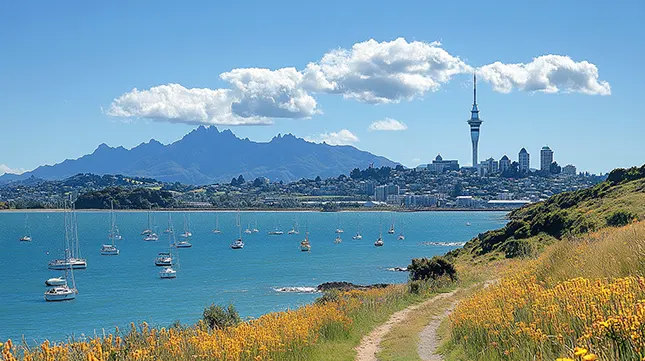
There are plenty of great reasons to consider making the move.
There are many reasons British citizens choose to relocate to the Land of the Long White Cloud. Here are a few that stand out:
- Quality of Life: Ranked high on global liveability indexes, New Zealand boasts an excellent work-life balance, an advanced healthcare system, and various lifestyle options.
- Scenic Beauty: New Zealand is famed for its striking landscapes, from the rolling hills of Waikato to the towering peaks of the Southern Alps. Outdoor enthusiasts and photographers will find no shortage of inspiration.
- Community Vibe: Kiwis (as New Zealanders are affectionately known) are known for being warm, welcoming, and helpful, making it easier to integrate into local communities.
- Opportunities for Families: The country’s education system is well-regarded worldwide, and it offers numerous family-friendly recreational and cultural activities.
If you’d like to explore more about New Zealand life, head to the country’s official tourism website.
2. Visa Requirements and Immigration Pathways
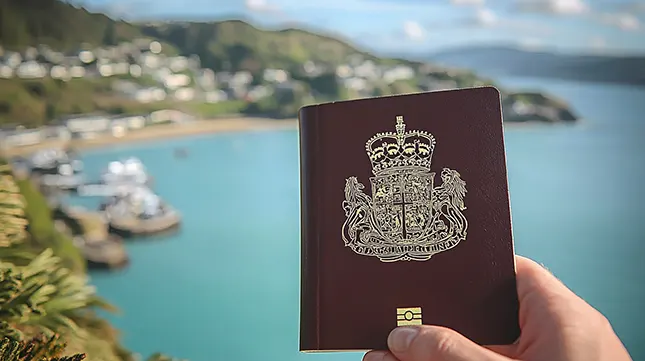
Staying up to speed with the Visa requirements in New Zealand is key.
A move to New Zealand from the UK typically starts with selecting the right visa.
Immigration rules are periodically updated, so always verify the latest information on Immigration New Zealand’s official site.
While there are other categories you can explore, the following four are the most popular choices.
Key Visa Categories
- Skilled Migrant Visa: Ideal for those with qualifications and experience in demanding fields, such as healthcare, IT, engineering, and construction.
- Work-to-Residence Visa: If you have a job offer from a recognised New Zealand employer, this visa can be a stepping stone to permanent residency.
- Entrepreneur Visa: Tailored for individuals planning to start or invest in a business within New Zealand.
- Family Visas: If you have close relatives living in the country, you may be eligible for a partnership or dependent child visa.
Visa Updates (2024–2025)
- The Skilled Migrant Category criteria were updated in late 2025, focusing on industries facing labour shortages known as the In-Demand Jobs List, also referred to as the Green List.
- Check Immigration New Zealand’s news page for current eligibility details.
3. Where to Live in New Zealand
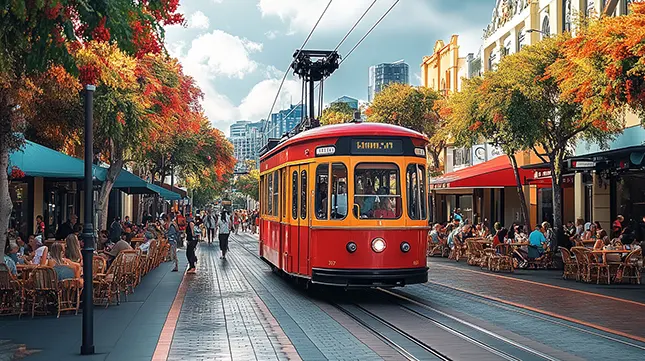
There are a number of wonderful locations across the country.
Choosing where to settle in New Zealand often depends on your lifestyle preferences, job opportunities, and budget.
Here are some of the top relocation destinations and some information about each to help you decide what area is best for you.
Auckland
Auckland is New Zealand’s largest metropolis, merging stunning harbours with a lively culinary scene.
For a Brit, it feels cosmopolitan yet more laid-back than major UK cities like London.
Housing can be pricey, but job prospects are strong, especially in tech and finance.
Access to beaches, parks, and nearby islands offers a refreshing outdoor lifestyle.
Wellington
Wellington, the nation’s capital, boasts a vibrant arts scene, quirky coffee culture, and a picturesque harbour.
For UK newcomers, Wellington combines the feel of a compact city with a unique creative buzz.
Windy weather is typical, but the city’s charming laneways, walkable streets, and constant cultural events make up for it.
Christchurch
Christchurch is on a rebuilding journey, blending heritage architecture with modern designs.
A British expat might appreciate its cycle-friendly streets, gardens, and easy access to the beautiful outdoor spaces surrounding the city.
The city centre has a flourishing arts vibe thanks to innovative renewal projects. Winters can be cold, but the scenic Southern Alps aren’t far away.
Hamilton
Set by the Waikato River, Hamilton has a more relaxed pace than the bigger towns and cities.
It’s a growing hub for agriculture, research, and education, with a strong community feel.
UK expats enjoy better housing affordability compared to Auckland.
Weekend escapes include trips to Hobbiton or the region’s surf beaches.
Tauranga
Tauranga is a buzzing coastal spot famous for its sunny climate and Mount Maunganui’s beautiful beach. It’s popular with families and retirees seeking a laid-back lifestyle.
For Brits, the relaxed pace of life here is a big draw, although job opportunities often centre around tourism and services rather than heavy industry.
Napier-Hastings
Napier-Hastings anchors Hawke’s Bay, which is celebrated for its Art Deco heritage, vineyards, and orchards.
UK arrivals enjoy the Mediterranean-like climate, scenic coastal roads, and vibrant food-and-wine culture.
Although it’s quieter than cities like Auckland, its warm sense of community and access to plenty of outdoor activities make it an appealing choice for many.
Dunedin
Located in the south of New Zealand, Dunedin is steeped in Scottish heritage and offers a distinctive charm for UK expats.
The city’s historical architecture, lively student scene, and accessible wildlife reserves create a unique vibe.
Winters can be brisk, but local craft breweries, cultural festivals, and friendly locals keep things enjoyable year-round.
Palmerston North
Palmerston North, in the Manawatū region, is a compact university town with a youthful feel.
UK immigrants appreciate its lower living costs and close-knit community.
Employment in the region often revolves around education and research.
Mountains, rivers, and scenic trails are only a short drive away, perfect for weekend breaks and outdoor fun.
4. Property Options in New Zealand

You will find a range of property types at various different price points.
If you plan to emigrate to New Zealand, you will likely eventually want to purchase a home there.
One significant difference between UK and New Zealand housing is space. New Zealand doesn’t have a lot of high-density developments like so much of the UK.
You have plenty of choices when looking for a home here.
Whether you want a large home in the suburbs with a garden and room for children and pets, open space and land in the countryside, or a bright downtown flat in the city, New Zealand has options for the lifestyle you’re looking for.
Unless you settle somewhere particularly remote, you can expect to enjoy your home without wasting hours of your life commuting.
Though not an exact science, you can expect to pay around £414,000 for a home. However, the average fluctuates due to market changes, just as with the UK.
It is possible to purchase a sizeable three-bedroom detached property for much less than the national average.
For a region-by-region average residential house rice, visit the Statista website.
Alternatively, you can search websites such as Realestate.co.nz to find out what is currently for sale nationwide.
To delve deeper into the key stages of buying a home in New Zealand, follow this simple step-by-step guide produced by trademe property
5. Renting a Home in New Zealand
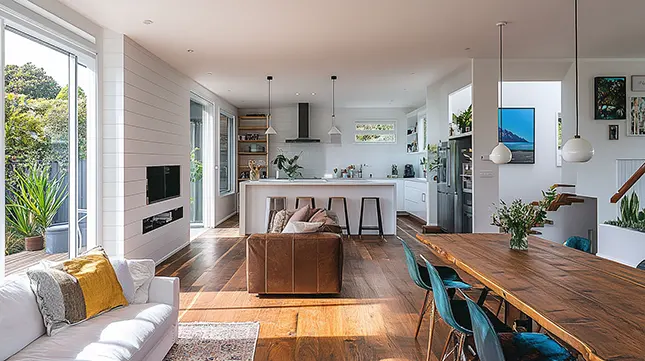
Renting a property is a great choice for many making such a big move.
Initially, it makes sense to rent a property, and one of the first steps is finding a comfortable place to call home.
Renting can be tricky without the correct information, especially regarding legal requirements and tenant rights.
Below are essential tips every expat should review before signing a lease:
- Choose the Right Property Type: Decide whether you want a standalone house, an apartment, or shared accommodation based on lifestyle and budget.
- Review the Tenancy Agreement: Carefully read all terms, including the rent amount, payment schedule, and notice periods, and ask for clarifications if necessary.
- Understand Tenant Rights and Responsibilities: Familiarize yourself with New Zealand’s Tenancy Services to know your obligations and available legal support.
- Budget for Additional Costs: Remember to include utilities, internet, and any mandatory insurance fees in your total monthly expenses.
- Inspect the Property Thoroughly: Check the insulation, heating, and overall condition to ensure comfort and compliance with local regulations.
- Record Property Condition: Take photos or videos before moving in and note any damages in writing to avoid disputes later.
- Communicate with the Landlord: Keep an open line of communication to address maintenance issues promptly and maintain a positive relationship.
- Know the End-of-Tenancy Procedures: Understand notice requirements and cleaning expectations and confirm how to recover your bond.
6. Cost of Living in New Zealand

There are some clear differences in the cost of living in the UK and New Zealand.
While the cost of living is often cited as being higher than in some parts of the UK, salaries and lifestyle advantages help to offset these increased expenses.
As of January 2025, here’s a rough breakdown:
- Accommodation: Renting a one-bedroom apartment in central Auckland could cost around NZD $2,100–$2,500 per month, while outside of Auckland or in smaller cities, expect to pay around NZD $1,600–$2,000.
- Groceries and Shopping: Food prices can be slightly higher due to local production costs and import fees. Major supermarket chains, including Woolworths, New World, and PAK’nSAVE, visit the sites and compare prices.
- Transport: Public transportation in Auckland, Wellington, and Christchurch is efficient. A monthly bus pass in Auckland might cost around NZD 150– $200. Owning a car is common, especially for those in regional areas, but fuel prices and registration fees can add up.
- Utilities and Internet: A mid-sized household will pay roughly NZD $180–$250 monthly for electricity, gas, and water combined. Internet packages can range from NZD $70–$120 a month, depending on the provider and the speed.
For current cost-of-living insights and direct comparisons, visit Numbeo.
7. Healthcare System in New Zealand

New Zealand has an excellent healthcare system.
As the UK’s NHS healthcare system continues to struggle, it is pleasant news that living in New Zealand healthcare has a different outlook.
The system is a blend of public and private services, and as a resident, you’ll generally have access to subsidised healthcare, although some costs still apply (for example, GP appointments).
- Accident Compensation Corporation (ACC): The ACC scheme is unique in that it covers accidental injuries for residents and visitors. For details, visit https://www.acc.co.nz/.
- Reciprocal Agreement: The UK and New Zealand have a reciprocal health agreement, offering limited coverage for immediate and urgent treatments. Still, obtaining health insurance for comprehensive care is advisable, especially if you plan to stay long term.
- Finding a GP: Enrolling with a local GP (doctor) is straightforward, but be sure to register with your local GP soon after you arrive to ensure continuity of care.
8. Education and Schooling

Schools are a top consideration for those moving with children and New Zealand doesn’t disappoint.
New Zealand’s educational system is well-regarded globally and strongly focuses on holistic development.
If you are moving with children or plan to start a family soon after you arrive, you’ll find a variety of schools and curricula.
- State Schools: Public schools follow the national curriculum and are free to attend for residents, though you’ll usually pay a voluntary donation and activity fees.
- State-Integrated and Private Schools: State-integrated schools incorporate a unique character (e.g., religious affiliation), while private schools are independently governed and often charge higher tuition fees.
- Tertiary Education: New Zealand’s universities rank highly worldwide. If you or your older children are looking into further education, check out institutions like the University of Auckland or Victoria University of Wellington.
- Resources: Visit the Ministry of Education website to learn about school zones, performance reports, and enrolment procedures.
9. Jobs and Employment

There are a wide range of jobs available across various different sectors.
As of January 2025, the job market in New Zealand remains stable, with significant demand in healthcare, IT, construction, and seasonal tourism roles.
British qualifications are generally well-regarded, particularly in specialist fields.
So, how do you go about finding employment?
Here are some of the best places to start:
- Job Search Platforms: Look for vacancies on official job boards like https://jobs.govt.nz/ (for government roles) or popular sites like https://www.seek.co.nz/.
- Networking and Recruitment Agencies: Attending industry events, workshops, and webinars can help you connect with employers. Recruitment agencies often list specialised roles that may not appear on general job boards.
- Workplace Culture: Kiwis appreciate a strong work-life balance, so expect a more relaxed environment compared to the UK’s corporate culture. Teamwork and open communication are highly valued.
The New Zealand Immigration website has invaluable information about how to get work as an expat in the country.
The site also offers assistance with interview techniques and tips and key industry-specific skills currently needed in New Zealand. It is well worth checking out.
10. Culture, Lifestyle, and Settling In

The culture in New Zealand is rather different to the UK.
Adapting to life in New Zealand is often considered straightforward for British expats, thanks to shared language and similar cultural nuances.
That said, there are a few key differences to be aware of:
- Maori Culture: Maori customs and language are integral to the national identity. You’ll often hear Maori greetings (e.g., “Kia ora”) and see dual-language signs. Engaging with local cultural practices helps you settle in and appreciate the country’s heritage.
- Outdoor Activities: From hiking (known locally as “tramping”) to water sports, New Zealand’s natural playground encourages an active lifestyle. National parks like Fiordland and Tongariro are world-renowned and ideal for getting outdoors.
- Food and Drink: You’ll enjoy a mix of Pacific, European, and Asian cuisines, reflecting the country’s multicultural population. Kiwis love markets. Don’t miss the local farmers’ markets for fresh produce and artisanal goods.
11. Practical Tips for Your First Few Weeks

There are several things you can do to make your move easier.
The first weeks in any new country will feel like a whirlwind, with plenty of key things to consider.
Check out this handy list to make these essential task more manageable:
- Banking: Major banks include ANZ, ASB, and BNZ. Opening an account usually requires ID (passport), proof of address, and sometimes proof of residency.
- Mobile and Internet: Popular providers are Spark, Vodafone, and 2degrees. Compare data bundles before committing to a plan.
- Driving License: You can use your UK driving licence for up to a year in New Zealand, but you’ll need to convert it if you plan to stay longer. The NZ Transport Agency website has all the details.
- Public Holidays and Work Entitlements: Familiarise yourself with New Zealand’s public holidays, as well as minimum wage and leave entitlements. These are outlined on the Employment New Zealand site.
12. Making Friends and Joining the Local Community
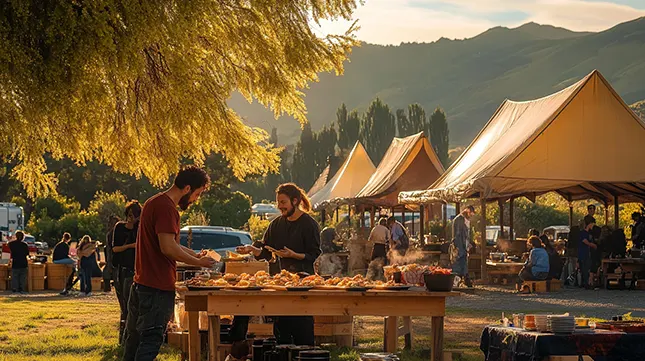
Be sure to branch out and meet some new people when making the move.
One of the quickest ways to settle into life as an expat is to start making new friends as soon as possible.
You will have bad days when you miss family and friends at home, but keeping a busy social diary will ease these feelings.
There are plenty of ways to meet new people and make friends when moving to New Zealand, including:
- Join Local Clubs: Whether you’re interested in rugby, hiking, or theatre, there’s likely a local club or group that shares your passion. Volunteering can also be a great way to meet people and give back.
- Expat Forums: Platforms like InterNations offer online communities and in-person events to help you connect with fellow newcomers.
- Attend Community Events: Local councils frequently host festivals, fairs, and cultural events. Checking city council websites and Facebook groups is an excellent way to stay informed.
13. Final Thoughts
Moving to New Zealand from the UK requires extensive research, organisation, and an adventurous spirit.
The rewards, however, can be immense; think of a healthier lifestyle, welcoming communities, and some of the world’s most stunning natural landscapes.
By securing the correct visa, choosing an area that aligns with your career and family needs, and immersing yourself in Kiwi culture, you’ll have a solid foundation for a fulfilling life in Aotearoa (the Māori name for New Zealand).
Remember, each expat journey is unique. While this guide covers the essentials, seeking professional advice for your specific circumstances is wise.
Kia kaha, and all the best for your move down under!
14. Moving Your Possessions to New Zealand

Relocating an entire household to the other side of the world can be complex. However, thorough research and professional support make it smoother:
- Shipping Options: Full-container shipping or shared containers (groupage) are common ways to move belongings from the UK to New Zealand.
- Customs Regulations: New Zealand has strict biosecurity checks. Items like outdoor equipment, wooden objects, or plant materials must be thoroughly cleaned or declared. Check New Zealand Customs for the latest rules.
- Moving Companies: Choose accredited international moving specialists who can handle customs paperwork and provide door-to-door service. Request detailed quotes and compare services before deciding.
Moving with White & Company

Moving to New Zealand involves numerous tasks and can quickly become overwhelming without some expert help.
That’s why choosing a professional removal company like White & Company is so crucial.
Our extensive experience, over 150 years in international relocations, ensures your belongings are managed with the highest care from start to finish.
As recognised members of BAR, FIDI, and OMNI, White & Company upholds exceptional standards in packing, shipping, and handling fragile or bulky items.
By entrusting them with your possessions, you free up valuable time to focus on other aspects of your move, confident that your shipment is secure and well-organised.
From door to door, White & Company strive to make your transition hassle-free. With professional teams stationed across the UK, we can expertly prepare each item for export, using the best materials and methods.
Our dedication to customer satisfaction means we are always on hand to answer questions or provide advice.
To get your move underway, call White & Company or fill out our quick quote form. You can even chat with their Bot for immediate assistance.
Let our proven expertise transform your international relocation into a smooth journey toward your exciting new life in New Zealand.

Max is a seasoned writer and blogger in the real estate and home moving sectors, as well as a knowledgeable source of information for expatriates living and working abroad. His detailed insights have helped thousands of people move and live abroad with greater simplicity and ease.
Posted in: News
Leave a Comment (0) ↓


